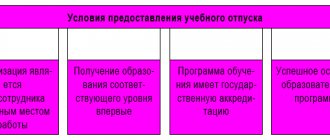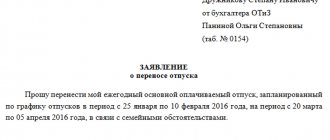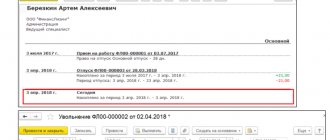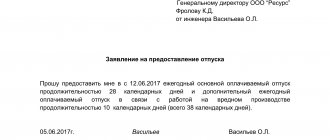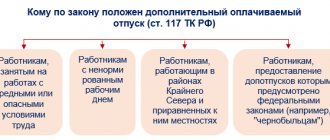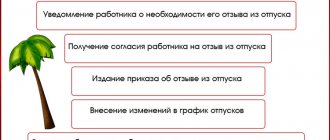Employees often wonder whether they can be fired on the last day of vacation or not. Most often, such doubts arise when you want to leave without fulfilling the warning period established by the Labor Code of the Russian Federation. Let us say from the outset that such a procedure is not prohibited by law. But you need to pay attention to certain points that distinguish it from other cases of dismissal.
Also see:
- Is it possible to be fired on a day off?
- Is it possible to fire someone on a holiday?
About leave with dismissal
The possibility of taking leave with subsequent dismissal at one’s own request is discussed in Article 127 of the Labor Code. Upon written request from the employee, unused vacations may be granted to him with subsequent dismissal.
The first important clause of the legal norm: the provision of rest is excluded if the employee is fired for guilty actions. Only a conscientious and disciplined employee can take the required days before terminating an employment contract. The list of guilty actions for which it is impossible to use vacation days instead of compensation is in Article 81 of the Labor Code of the Russian Federation.
The second important caveat: when characterizing an employee’s right to leave with subsequent dismissal, Article 127 of the Labor Code of the Russian Federation uses the wording “vacations can be granted,” which means that the employer is not at all obliged to provide the employee with rest before terminating the contract. The head of the organization retains the right to refuse even a conscientious employee and pay compensation for unused days in return. Or provide only part of the allotted period for rest, and compensate the rest of the time financially. Explanations on this matter were given by Rostrud in Letter dated December 24, 2007 No. 5277 6-1.
It turns out that an employee can take advantage of the chance to rest before looking for a new job only by mutual agreement with management.
Entry in the work book
The Labor Code of the Russian Federation obliges the organization to make an entry and issue a work book to the employee on the day of dismissal. An employee's resignation during vacation is recorded in the normal personnel manner.
Post content:
- serial number;
- date of termination of the employment relationship;
- the reason for the employee's departure;
- date and number of the dismissal order.
According to Art. 84.1 of the Labor Code, the last working day is the day of termination of the contract. Some personnel officers make a mistake when filling out a work book, indicating the date of the order instead of the date of dismissal.
If the employment contract has expired, the employee has the right to leave with the upcoming dismissal, even if the rest period extends beyond the specified period. The last day of vacation will be regarded as the date of dismissal.
Dear readers! To solve your problem right now, get a free consultation
— contact the on-duty lawyer in the online chat on the right or call:
+7
— Moscow and region.
+7
— St. Petersburg and region.
8
- Other regions of the Russian Federation
You will not need to waste your time and nerves
- an experienced lawyer will take care of solving all your problems!
Two ways to go on vacation before quitting
The first option: the employee goes on vacation according to a pre-approved schedule, having written a statement of his own free will before or while already on vacation. At the same time, he can take time off both on pre-planned days according to the schedule, and on those days that he did not have time to use previously.
Second option: the employee writes an application for leave at the same time as an application for resignation of his own free will. In this case, you may not adhere to the established schedule.
The date of termination of the employment contract under Article 127 of the Labor Code of the Russian Federation is in any case considered the last day of rest.
But management can hire a new employee to replace a resigning employee immediately, without waiting for the end of the vacation.
The only chance to retain his position for an employee who has changed his mind about resigning is to withdraw his application on the last day before going on vacation. You can’t do this while you’re on vacation.
Material on the topic How to withdraw a resignation letter
Procedure for dismissing an employee
An employee's stay on vacation does not change anything significantly. Dismissal on the last day of voluntary leave occurs according to the standard scheme. Having received an application from a subordinate, the manager endorses the appropriate order.
Typically, the employee’s familiarization with the document is confirmed by his signature.
If the employee on vacation is far from the office, the manager draws up a report stating that it is impossible to familiarize himself with the order.
The presence of several full-time employees as witnesses when drawing up the document will help in the event of a possibility of challenging the dismissal.
Then the organization draws up a mandatory financial document - a settlement note in form T-61 - based on statements and payment papers that reflect all previous accruals: salary, remuneration, allowances, etc.
So, the last day at the company involves receiving all documents and certificates, as well as cash payments due to the employee under the terms of the collective or employment agreement.
Application and order for leave with subsequent dismissal, registration procedure
The employee usually makes 2 statements:
- on vacation followed by dismissal;
- for dismissal with reasons.
And the management issues 2 orders:
- on granting leave (based on the employee’s first application);
- on termination of the employment contract (based on the second application).
It is also possible to draw up one application from an employee: you can write an application for leave with subsequent dismissal at your own request - this does not contradict the norms of the Labor Code of the Russian Federation.
But when using a unified form of documents, the employer still issues two orders, because the form of a single order is not officially established. Forms of orders that can be used are documents of form T-6 (T-6a) and T-8 (T-8a), recorded in Resolution of the State Statistics Committee dated January 5, 2004 No. 1. The original is attached to one of them as a basis, and for the second - a copy of the employee’s application. Order forms must be approved by the company's management as accounting documents.
The second option for management is not to use standardized forms, but to develop the order form yourself. Then you can execute both actions with one order. The main thing is that it contains the required details of the primary accounting document.
Application for leave followed by dismissal, sample 2021
The employee is given a work book on the last day before the vacation, despite the fact that he will be fired on the last day of his vacation.
Example: Dudnikova I.N. takes 28 days of rest from April 17, 2018 and quits. She receives her work book and paycheck on April 16—the last working day before leaving. She will be officially fired on May 16, 2018, the last day of rest. Please note that two more days are added to the main days for non-working holidays - May 1 and May 9. Holidays are extended due to holidays. This period is counted in the work experience of I.N. Dudnikova, which is reflected in the order and work book.
Order for leave followed by dismissal, sample 2021
A sample of a self-developed order form based on the example application given above. An order drawn up in this form is issued once.
Related material The Constitutional Court dealt with compensation for unused vacations
At the initiative of the employer
There are also situations when the employee himself does not want to quit on the last day of vacation, but it is during this period that he is given a work book and a settlement is made with him.
In accordance with Part 6 of Art. 81 of the Labor Code of the Russian Federation, it is prohibited to dismiss employees during their vacation, if the termination of employment relations is not related to the liquidation of the organization. This also applies to the last day of vacation.
Liquidation of an organization
Since liquidation, in accordance with Art. 180 of the Labor Code of the Russian Federation, they warn 2 months in advance (the employee is sent a written notice in which he must sign), a situation with dismissal on the last day of vacation could arise in the following cases:
the employee was notified in a timely manner, but went on vacation according to the schedule; the liquidation coincided with the last day of rest;- the employee wrote an application for leave with subsequent dismissal due to liquidation.
Upon liquidation, the employer must:
- notify the employee in a timely manner;
- offer him to resign early, paying compensation for the days remaining before the liquidation of the organization in the amount of the average salary (the employee must write a statement of consent to such dismissal);
- pay severance pay for the duration of employment (within 2 months from the date of liquidation, sometimes this period is extended by 3 months).
Staff reduction
You cannot lay off an employee who is on vacation. But since this procedure is almost similar to liquidation (only in case of layoffs, the employer is obliged to offer the laid-off employee vacancies in the organization), it is necessary to highlight several situations:
- the employee was notified before going on vacation, wrote a statement with subsequent dismissal;
- The employee received notice of layoffs while on vacation and will be fired later, after returning from vacation.
The latter situation is controversial, since labor legislation does not directly indicate that dismissal must be made strictly two months after employees receive the notice . If we turn to the wording, then in Art. 180 of the Labor Code of the Russian Federation contains the words “not less than 2 months”.
The courts also take this as their starting point, allowing the employer to fire the employee later (for example, Determination of the Tver Regional Court dated December 27, 2011 No. 33-5016). In this case, there is no need to notify the employee again.
Popular questions
Workers who plan to take a break before resigning are often concerned about issues related to registration and payment. We will answer the most popular of them.
Can I be fired while on vacation?
Art. 81 of the Labor Code of the Russian Federation states that termination of an employment contract at the initiative of the employer during rest is not allowed. Except in cases of liquidation of the company or termination of the activities of an individual entrepreneur.
Is it possible to resign during vacation at your own request?
You can resign on your own initiative during the rest period. The main thing is to comply with the deadline for filing an application for termination of the employment contract (2 weeks). Moreover, by agreement with the authorities, the two-week deadline can be circumvented.
Is it possible to go on vacation followed by dismissal without work?
Often, employees believe that they cannot quit at this time, since they are required to work for two weeks before leaving, so they often ask the question: how to go on vacation with subsequent dismissal without working off. However, the Labor Code does not contain the concept of “working 2 weeks before dismissal.” Part 1 art. 80 of the Labor Code of the Russian Federation states: “notify the employer in writing at least 2 weeks in advance.” It is quite possible to warn your superiors about your intention to quit while you are on vacation. You are not required to be present at the workplace for the next 2 weeks.
When will the money be paid?
The employer is obliged to pay wages and vacation pay, as well as issue a work book and other documents to the employee before terminating the employment contract. There is some discrepancy in the dates of payment of holiday pay and wages in the final settlement. You will be paid the money three days before going on vacation (Article 136 of the Labor Code of the Russian Federation). And the salary and documents must be issued on the last day before leaving. These payments are not included in the salary. This results in a slight spread in the days of payment of vacation pay and wages, which is inconvenient for both employees and employers. But these are the calculation rules established by labor legislation (Article 136, Article 140 of the Labor Code of the Russian Federation). If you deviate from them, the employer faces a fine.
Is salary retained for days not worked?
An employee is given 28 calendar days of rest as a general rule, regardless of whether he has managed to work for the required year. But only those days that would be subject to compensation upon termination of the contract are paid. Therefore, yes, if an employee received full annual paid leave, but did not have time to work the allotted time for its provision, upon dismissal, the corresponding amount will be withheld from his salary. These are the explanations of Rostrud in Letter No. 5277-6-1 dated December 24, 2007. True, no more than 20% of the amount can be withheld (Article 138 of the Labor Code of the Russian Federation). And in some cases, deductions are generally prohibited (more about this in Article 137 of the Labor Code of the Russian Federation). Providing an incomplete rest period (as many days as the employee managed to work in a working year) is not provided for by the Labor Code of the Russian Federation, although it is possible by agreement of the parties.
To make it clearer, let's give an example.
Dudnikova I.N. I wrote a letter of resignation for 28 calendar days. And in the last working year, she worked only 10 months and 12 days (since 12 days are less than half a month, the period is rounded down. If the employee had worked 10 months and 16 days, they would have been counted as 11 months). For 10 months worked, Dudnikova I.N. Allowed rest: 28 days / 12 days × 10 months. = 23.3 days. During the final settlement, she was entitled to funds only for 23.3 days, but was paid for all 28 days.
It turns out that the employee did not have time to work 28 - 23.3 = 4.7 days in the working year, but received payment for them. If vacation pay received for 28 days amounted to 10,000 rubles, then the following amount must be withheld from Dudnikova’s salary: 10,000 rubles. / 28 days × 4.7 days = 1678.57 rubles.
Who cannot get leave upon dismissal?
There is a category of employees who are not granted leave with subsequent dismissal. Thus, an employee will be denied rest if he:
- missed work without a good reason;
- falsified documents or provided other false information during employment;
- ignored or dishonestly performed official duties;
- was observed at work in a state of alcoholic or other form of intoxication;
- revealed company secrets or disseminated government information;
- intentionally damaged company property, resulting in significant losses;
- stole or embezzled entrusted funds;
- neglected safety requirements, which could cause or lead to serious consequences both for the company and for other employees;
- committed an immoral act or lost the trust of management.
In this situation, the manager independently decides whether to grant the employee leave. In case of refusal, the person must be paid compensation, the amount of which is calculated individually.
